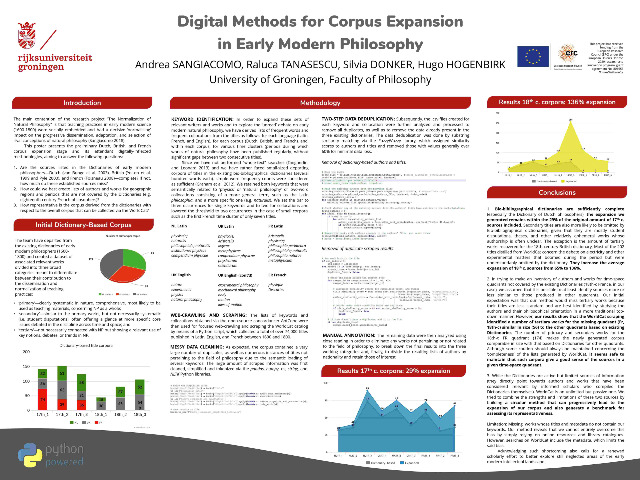Digital Methods for Corpus Expansion in Early Modern Philosophy Research
| Date: | 18 September 2019 |
| Author: | Raluca Tanasescu; Andrea Sangiacomo; Silvia Donker; Hugo Hogenbirk |
In September 2019 we presented a poster at the DH Benelux annual conference, organized at Université de Liège (Belgium), in which we reported on the initial corpus expansion stage and its attendant digitally-inflected methodologies of the ERC-funded...
Spinozism as a game: Meta-readings of the Ethics
| Date: | 02 September 2019 |
| Author: | Maxime Rovere |
There are many ways to read Spinoza, actually many ways to practice philosophy. Some discuss the conceptual organization within Spinoza’s system, others study Spinoza’s sources, others can say a lot about the historical context. How do we conceive of the...
Spinoza’s meditations and why today’s philosophers don’t meditate anymore
| Date: | 29 March 2019 |
| Author: | Andrea Sangiacomo |
The knight move: two steps forward, one step away from Descartes
| Date: | 08 March 2019 |
| Author: | Andrea Sangiacomo |
In a previous post, I suggested that it may be helpful to look at Descartes’s Meditations as actual meditations. Over the past three weeks, I’ve been teaching the Meditations to first year students. I learned a lot from this experience. This post is an...
Cogito, sum objectum: Descartes in a Buddhist perspective
| Date: | 01 February 2019 |
| Author: | Andrea Sangiacomo |
Second Meditation. The meditator just reflected that even if there is an evil demon who deceives him or her, then s/he necessarily exists in order to be deceived. Well known argument. Just after this famous statement of the Cogito, Descartes writes:
The Impact of ‘Philosophical Prejudice’ (feat. Berkeley and Reid)
| Date: | 07 December 2018 |
| Author: | Peter West |
It’s worth noting from the outset that in what follows I am interested in philosophical prejudice – i.e. a commitment or set of commitments which is either unargued-for or unacknowledged (or both) – rather than any other kind of prejudice. In the context...
Antagonising the canon
| Date: | 16 November 2018 |
| Author: | Barnaby Hutchins |
In turns out that Laura Georgescu (the editor of this blog) and I happen to be working on somewhat convergent papers. In my terms (Laura, sensibly, wouldn't put it as grandiosely as this), they're both about metametaphysical pluralism—the position that...
Two hypotheses on the history of thought
| Date: | 02 November 2018 |
| Author: | Andrea Sangiacomo |
I’m about to start a five-year project on “The Normalisation of Natural Philosophy: How teaching practices shaped the evolution of early modern science” (see description here). The leading intuition of the project is the following:
On being and not being the master of one’s own imagination
| Date: | 28 September 2018 |
| Author: | Doina Cristina Rusu |
In his entry from the Encyclopédie (1751–1766), Voltaire makes a puzzling statement: we ought to understand that “on n’est pas le maître de son imagination.” As Lorraine Daston observes, Voltaire is presenting a view that is typical for the Enlightenment:...
Against confidence in opinions – with Glanvill
| Date: | 11 September 2018 |
| Author: | Laura Georgescu |
We’re obsessed with confidence. Glossy magazines and their online descendants, along with social media, YouTube, and the vast self-help literature are all swimming in exhortations to be more confident, and advice as to how. There's plenty of academic...











